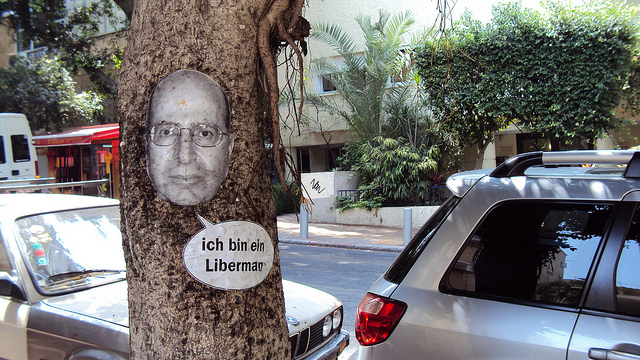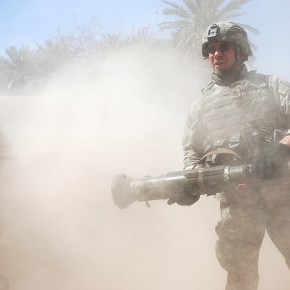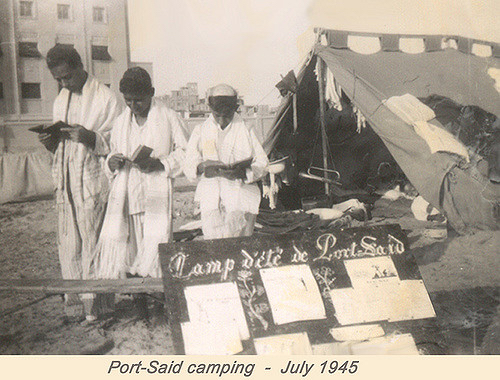The picture is is not pretty. Israel finally has a new government in place, and we now know who its ruling triumvirate is. Most importantly, Benjamin Netanyahu will appoint a staunch hawk, Moshe “Bogie” Ya’alon, to replace retiring Defense Minister Ehud Barak. We would do well to consider this selection.
In Israel, major decisions on security and policy are made by small circles of people. In the Netanyahu government, there has been the so-called “Group of Eight” consisting of the most powerful and influential ministers, and military and intelligence leaders. The composition of that group is likely to change now, but something like it will certainly be a key decision-making forum.
When it comes down to it, Bibi makes the decisions, but he is heavily influenced by the Defense and Foreign ministers. The Foreign Ministry is being held in trust for Avigdor Lieberman, who has been serving in that post, until he can legally resume his position. He is currently under indictment on charges of breach of trust and fraud. Until then, Netanyahu will be acting Foreign Minister as well as Prime Minister.
These are known quantities and our knowledge of them certainly gives no reason for hope. What about Ya’alon replacing Barak, who was himself hardly a man of peace? Longtime Israeli peace activist Uri Avnery describes Ya’alon as “…an extreme militarist, who sees all problems through the sights of a gun.”
That seems apt. Ya’alon appreciates very little outside of military strategy, which is problematic as Defense Minister. That role, as is the case in many countries, requires political and diplomatic savvy as well as military. Particularly in an Israeli context.
Ya’alon’s outlook on the Palestinians is clear: the former IDF chief is opposed to settlement withdrawal, believes that Israel is entitled to all of the land, and the Palestinians, only to that which Israel deems fit. Unsurprisingly, Ya’alon believes that the idea of peace is passé at best. On Iran, he is a hawk, but prefers that the United States be the one to attack Iran, rather than Israel. Like his boss, Netanyahu, Ya’alon is reluctant to bomb Iran without US support,. However, Ya’alon is very vocal about pushing for an Israeli strike if Israel believes that the US, contrary to its repeated statements, decides that containment of a nuclear Iran is preferable.
Ya’alon’s character came out very clearly in an interview last June with Ha’aretz reporter Ari Shavit. In response to a question about Syrian chemical weapons which Shavit prefaced with the statement that the Syrian regime “…is defending its honor by killing thousands of innocent civilians,” Ya’alon responded by saying, “As of now, we are seeing good control by the Syrians of their chemical weapons supplies. But everyone with eyes in his head should prepare for future developments.” No comment on the Syrian atrocities, because Ya’alon sees no military significance there.
Ya’alon is an extremely unsophisticated thinker, so it comes as no surprise that he has on occasion made brazen statements that got him in trouble. In 2002, for example, he compared the Palestinians to a cancer. “The Palestinian threat harbors cancer-like attributes that have to be severed. There are all kinds of solutions to cancer. Some say it’s necessary to amputate organs but at the moment I am applying chemotherapy.” And he was equally venomous when it came to Israeli Jews with whom he disagrees. Of the decidedly moderate peace group, Peace Now, Ya’alon said “We are dealing again with a situation where the virus, which is Peace Now, and if you will, the elites, their damage is very great.”
In 2002, Ya’alon was appointed to the position of Chief of Staff of the Israeli military. Two weeks later, Israeli forces bombed a densely populated residential neighborhood in Gaza City, killing fifteen people and injuring many dozens. One of those killed was the actual target of the attack, Salah Shehadeh, a leading military figure in Hamas.
Israeli government excuses that it was unaware that there were civilians in the vicinity rang hollow, not only because of the fact that it was a residential neighborhood, but also because the bombing took place in the middle of the night. Ya’alon was the subject of an arrest warrant for war crimes in New Zealand in 2006, though this was cancelled by New Zealand’s Attorney General. Ya’alon also cancelled a 2009 trip to England fearing he would be arrested on similar charges.
More famously, Ya’alon was the head of the Israel Defense Forces Military Intelligence in 1996, and was one of the key decision makers for the attack on the United Nations Qana compound, which was serving as a refuge for Lebanese civilians from the Israeli “Operation Grapes of Wrath” campaign in the southern part of that country, that was occupied by Israel at the time. 106 civilians were killed in the attack. This time, the US organization, the Center for Constitutional Rights sued Ya’alon in US court, but the case was summarily dismissed.

Moshe Ya’alon also knows his way around right-wing policy world, in both the United States and Israel. The photograph above, of Ya’alon with the far-right Islamophobe Pamela Geller gives a hint of his general ideological leanings. Ya’alon spent a year working for the AIPAC-created Washington Institute for Near East Policy and also spent time at the Adelson Institute for Strategic Studies of the infamous Shalem Center. If you want neocon research credentials, these are the places to go.
Such a scholarly pedigree confirms Ya’alon’s status as a provincial ex-military officer, with a predictably Manichean worldview. His career might not be much different from some of his more reactionary predecessors. However, much better candidates for the job exist amongst Israeli’s military leadership, past, as well as present. This is an unusually charged appointment. It is an especially dangerous time to promote ministers as controversial as Ya’alon.
The sad truth is that Israel’s political echelon has moved so far rightward that when it comes to the standing issues of the occupation, dispossession and denial of any rights to the Palestinians and the ongoing standoff with Iran, Ya’alon isn’t going to make things much worse. However, there are areas where Ya’alon’s position could be wrongly decisive. Particularly in regards to post-Arab Spring unrest amongst Israel’s neighbors.
With ongoing upheavals in Egypt, a persistent civil war in Syria, a permanently unstable Lebanon, and growing tensions in Jordan, Israel is finding itself in an increasingly volatile nexus. Israeli intervention is always a temptation. Ehud Barak wasn’t an ideal defense chief for such a context. But he was sympathetic to Netanyahu’s preference for low-risk military engagements, and was always ready to act as an intermediary between Israel and its increasingly disenchanted patrons in the US and Europe.
Moshe Ya’alon will play no such moderating or diplomatic role. He might receive a better reception in Europe than Avigdor Lieberman does, but it still is not likely to be a warm one. With Ya’alon on one side, and Lieberman on the other, Bibi is going to be surrounded by very fearful advisors, who will only exacerbate his anxieties. Particularly if regional political temperatures continue to rise, as they promise to do.
Israels’ incoming Minister of Defense concurs with Netanyahu on Iran. He does not want Israel to undertake unilateral action. Ya’alon would prefer to to allow the US to work its sanctions, first. This will likely help thaw the frosty relationship between the Prime Minister, and Israel’s military and intelligence leadership a little. But perhaps not as much as one might think, given Ya’alon’s own complex relations with Israel’s security establishment. Indeed, he remains a polarizing figure amongst his ex-colleagues.
The second circumstance where Ya’alon could have a very negative impact is in the event the situation in the West Bank deteriorates. His leadership record during the Al-Aksa Intifada was extremely troublesome, even relative to similarly-minded Israeli military chiefs. His words and deeds since that time show he has grown no wiser.
Post-election views of Israel have centered on the formation of this government. A laughable amount of attention has been paid by outside observers to the disposition of the Education and Finance ministries, and the intricacies of drafting ultra-orthodox Israelis into the IDF. We might do well to take a harder look at the man who is now in charge of all the branches of the military of the Middle East’s sole superpower. There is good reason to assume his leadership will inflame regional tensions.
Photographs courtesy of Ronen E and Wikimedia. Published under a Creative Commons license.





